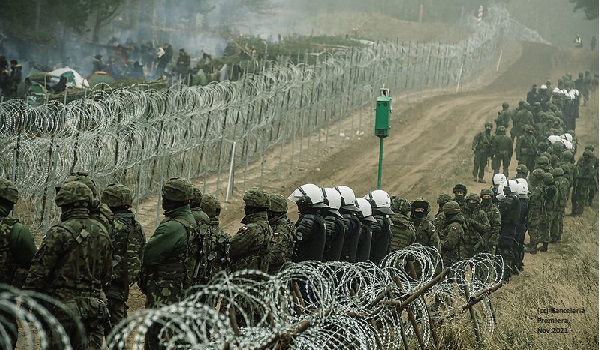Proposed EU measures to respond to the situation at the bloc’s eastern border have been challenged by the European Parliament’s Committee on Civil Liberties, Justice and Home Affairs (LIBE). A trip to Poland by German MEPs and MPs has confirmed that the situation for asylum seekers remains dire as authorities double down on border fortification. Poland’s highest court has found the ban on media access to the border to be “incompatible” with the country’s constitution.
On 13 January, the LIBE committee challenged Commission representatives on the European Commission Proposal for a Council Decision on provisional emergency measures for the benefit of Latvia, Lithuania and Poland. The measures aimed to respond to the arrival of 8,000 asylum seekers via the bloc’s eastern borders over the course of 2021. Home Affairs Commissioner Ylva Johansson said the situation “de-escalated significantly” after more than six months, but still deemed the “emergency” measures justified given the role of Belarus in “instrumentalising” migrants. Johansson called on Lithuania, Poland and Latvia “to have legislation where pushbacks are not accepted and not normalised”. Yet, all three member states have implemented “pro-pushback” legislation that breaches EU law. When asked to explain the absence of infringement procedures, Commission Vice-President Margaritas Schinas cited a lack of evidence. However, despite restrictions on access to the border, evidence of “widespread” pushbacks has mounted as both ECRE and the UN Refugee Agency (UNHCR) reiterated during the hearing. Further, according to Schinas, the Parliamentary Legal Service’s finding of incompatibility between EU and national law in the three Eastern member states: “is just a legal opinion, but we are talking about a political issue”. ECRE has repeatedly stated that the measures proposed adversely affect the right to asylum without adequately responding to the situation at the border. According to ECRE Director Catherine Woollard: “The measures proposed in our view make pushbacks more likely: if a model is based on border procedures, border detention and redirection to specific border crossings, all of those actions mean it is more rather than less likely that member states engage in denial of access”. At the LIBE hearing, Woollard said so-called temporary measures risk becoming permanent. ECRE continues to insist on: “respect for EU law, respect for the obligations that the member states have under EU and international law, and […] disapplication [of] the legislative proposals that have been passed […] that are not in conformity with EU law”.
Throughout 2021, at least 21 lives were lost in the Polish border forest: the true number is likely much higher given the restrictions on access to the zone. ECRE’s Catherine Woollard describes: “an extraordinary denial of access to humanitarian actors, something that is quite unprecedented […] we also note repression of civil society, lawyers, media and faith-based organisations trying to respond to this situation”. In late December, the UN said it had been denied access by both the Polish and Belarusian governments. A delegation of German MEPs and MPs that recently attempted to visit the border described an “exclusion zone” within the state of emergency area that has produced a “legal vacuum”. They highlight that activists and aid workers continue to find “people, including many families with small children, completely frozen and with sometimes serious injuries in the forest”. The delegation from Die Linke called for Poland to uphold EU law and evacuate those in need, and for the EU to withdraw proposals allowing deviation from asylum law. On 18 January, Pope Francis pledged to give 100,000 euro to help people stuck at the border.
Poland continues to respond by militarising the border, claiming that irregular movement at the border, although much-reduced, remain a “security threat”. Extensive barbed wire fencing and border guard deployments are in place, and a high-tech 186 million euro border wall is planned for completion by summer 2022. In the first 20 days of 2022, border guards claim to have stopped more than 600 attempts to cross the border. Polish authorities say they have dismantled a smuggling ring that has made 8.7 million euro profit from charging 3,000 euro per person for the facilitation of irregular migration from Belarus. According to the police, 90 per cent of the smuggled persons sought to reach other EU countries, mainly in Western Europe. Nonetheless, Poland received 7,700 asylum applications in 2021. 2,300 of these were from Belarusians, 1,800 from Afghans, 1,400 from Iraqis and 1,000 from Russians. In total, the government said 2,155 people met the conditions to be granted international protection over the year. Access to an asylum procedure is however far from guaranteed for people arriving on Polish territory. By 16 January, the Iraqi government said it had completed 4,000 returns under the aegis of Poland, Belarus and the EU: it is not clear what or if any due process safeguards were in place in these cases.
For nearly five months, the Polish government has banned journalists, aid workers, and independent observers from the border zone under hastily-introduced “state of emergency” legislation. On 18 January, the Polish Supreme Court ruled on a case which concerned three journalists who had been reprimanded for entering the emergency zone. The ruling said the constitution guarantees the rights “to circulate freely” and “to collect and publish information”. Despite being Poland’s top court, the Supreme Court does not have the mandate to abolish the emergency law. The judgment may however provide an avenue for challenging the restriction in future cases, according to ECRE member organisation the Helsinki Foundation for Human Rights.
For further information:
- ECRE, EU Eastern Borders: Belarus and Poland Enact Brutal Violence and Block Aid Workers, Lithuania Lifts State of Emergency, January 2022
- ECRE, EU Eastern Borders: Deadly Border Stand-Off Claims More Than 20 Lives, Syrians Appeal for Protection, Iraqis Face Few Opportunities Back Home, Lithuania Offers Cash for Returns, Green Light Goes Europe-Wide, December 2021
Photo: (cc) Kancelaria Premiera, 11 November 2021
This article appeared in the ECRE Weekly Bulletin. You can subscribe to the Weekly Bulletin here.

